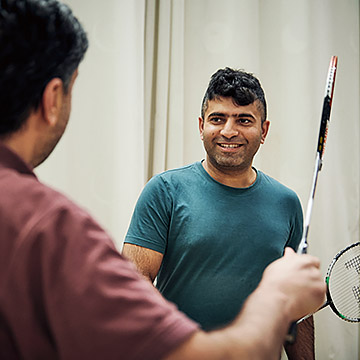In certain cases, an application can be submitted to the Parliamentary committee on naturalisation for it to assess whether the applicant should be exempted from the rules of Danish language skills.
Submission to the committee on naturalisation due to illness
The application will be submitted to the Parliamentary committee on naturalisation if an exemption has been requested from the requirement of Danish language skills due to illness, and if the following conditions are met:
- The applicant have been medically diagnosed with a long-term physical, mental, sensory or intellectual impairment and therefore is not able to meet – or do not have a reasonable chance of meeting – the requirement to provide evidence of passing the Danish language test 3 (or Danish language test 2), including by taking the test under special conditions and by use of special aids.
If the medical report shows that the long-term impairment does not hinder the applicant from being able to pass – or from having a reasonable chance of passing – a Danish test on the relevant level (for instance Danish language test 2 or Danish language test 1), then the case will only be submitted to the committee on naturalisation when the applicant have provided evidence of passing the test in question.
Furthermore, as a condition for submission to the committee on naturalisation, you must:
- provide evidence of having taken part in Danish training programme 3 (‘Danskuddannelse 3’) or – if you are not capable of providing this – Danish training programme 2 or at least Danish training programme 1 or a specially designed Danish course adapted to your personal conditions, and
- provide evidence of having attempted to sit a Danish test, including by taking the test under special conditions, by taking the test with the exemption of certain parts or by use of aids.
If you have not taken part in a Danish training programme and have not attempted to sit a Danish test as described, the case will be submitted to the Parliamentary committee on naturalisation, if a medical report presents evidence that you, due to long-term impairment, are not able to acquire competence in Danish and have not been able to take part in a Danish training programme or to attempt to sit a Danish test.
If you do not provide evidence of having taken part in a Danish training programme or having attempted to sit a Danish test, the Parliamentary committee on naturalisation will consider any other evidence of you having attempted to acquire competence in Danish to roughly the same level as a Danish person at the same stage of development and level of education. This will for instance be based on opinions from employers, associations, active support measures, private language schools etc.
During the assessment of whether to make an exemption from the requirements for evidence of Danish language skills, the Parliamentary committee on naturalisation will therefore consider whether you, within a few years, will be capable of acquiring competence in Danish on some level and will try to sit (attend) a Danish test.
The long-term physical, mental, sensory or intellectual impairment and the connection between the impairment and the lack of opportunity to acquire competence in Danish and take part in a Danish training programme or to attempt to sit a Danish test must be documented through a report by a medical professional.
In those cases, where a long-term impairment is caused by mental illness, a medical report must be completed by a medical specialist in psychiatry or a person with other medical background based on a previous psychiatric investigation. Thus, a psychologist’s opinion will in these cases not be sufficient.
Examples of mental illnesses are depression, schizophrenia and PTSD.
The medical reports must also meet the following requirements:
- The medical report must be no more than 2 years old at the time of application.
- The doctor must consider whether the applicant is able to take part in Danish training programme 1, 2 or 3 or in a specially designed Danish course adapted to the applicant’s personal conditions, including special needs education (for instance a special education for people with visual impairment, deaf people, people with PTSD etc.). If it is medically assessed that the applicant due to his or her impairment will not be able to take part in a specially designed Danish course adapted to the applicant’s needs, this must be justified by the doctor.
- The doctor must consider a few of the special conditions that people with impairments can be offered at tests in Danish. For example, that the particular applicant wishes to attempt to sit a test in a separate testing room, or sit a test in the presence of an assistant, or sit a test in his or her own home. Negative replies must be justified.
- The doctor must consider whether the applicant can try to sit a Danish test, provided that the applicant is exempted from one or more parts of the test – for instance the part concerning writing.
- The doctor must in detail consider the prognosis of the applicant's ability to take part in the Danish training programme or to sit a Danish language test 2 or Danish language test 1, including under special conditions, within 5 years.
- The doctor must elaborate the grounds of their medical assessment in depth, including whether the doctor is the applicant’s regular practitioner, for how long the doctor may have treated the applicant, and whether the doctor has assisted the applicant in connection with anything besides the completion of the medical report for use in the application for citizenship.
- If it is assessed that the applicant due to his or her impairment will not be able to sit Danish language test 3, the doctor must consider whether the applicant would be able to sit a Danish test on a lower level (Danish language test 2 or Danish language test 1), and (to the best of his or her ability) whether the applicant would be able to acquire competence in Danish on a lower level than Danish language test 3.
At the moment, there is no standard medical report that can be used for naturalisation cases.













